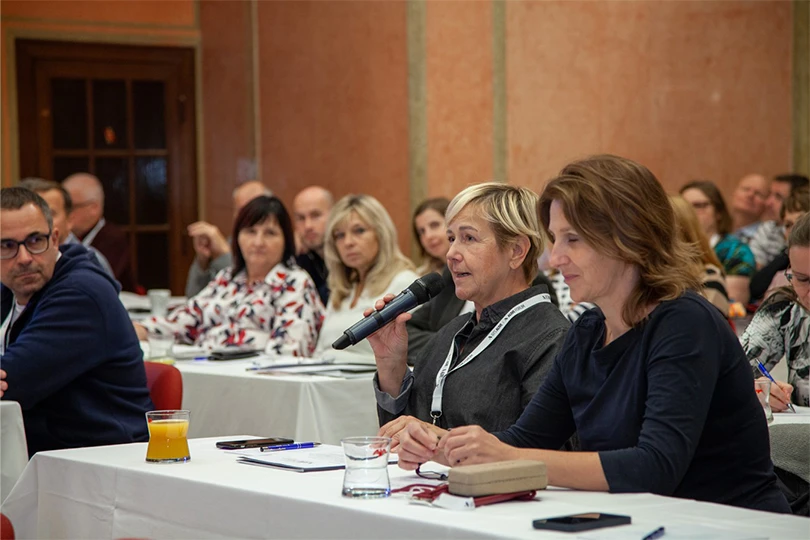One of the main topics at the Alive Forum 2024 conference for school principals was the administration and bureaucracy that affects them. This has been an ongoing issue for decades, but the conference presented some concrete solutions. These included the newly emerging law on educational registers, transferring building and technical responsibilities of schools to their founders, and abolishing mandatory annual reports. Another topic was the systemic functioning and funding of school psychologists. The conference was organized by GTS Alive, which, among other things, issues and manages ISIC student cards in the Czech Republic.
“According to our survey of 500 school principals, over 95 percent consider bureaucracy and administration to be a problem. That’s why we chose this area as the main topic of the conference and invited speakers from the Ministry of Education, the Chamber of Deputies, representatives of school founders, and the schools themselves,” said Radek Schich, director of GTS Alive.
Martina Běťáková from the Ministry of Education stated at the conference that a typical school principal has to perform the work of an entire board of directors and more. Among other things, they must act as financial, operational, and personnel managers, building and IT technicians, and legal specialists. According to her, a fundamental systemic error is that Czech principals are not only school leaders but also its statutory representatives. Most of the administrative duties they face stem from this.
According to Běťáková, principals shouldn’t be sitting around filling out reports—they’re too expensive for the state to do that. Some of these tasks should be transferred to school founders. The creation of school clusters or merged schools and the professionalization of non-teaching administration would also help. Additionally, unnecessary paperwork should be eliminated. Petr Halada, mayor of Kamýk nad Vltavou, who practices this in his municipality, agreed with transferring some responsibilities to founders. According to him, the local primary school principal never had to announce a selection process, and the municipality, as the founder, handles all major repairs.
MP Renáta Zajíčková from the Parliamentary Education Committee mentioned that there is currently no legislative support for data electronicization and digitalization in education, which would significantly reduce administration. This should change with a new law on educational registers, recently created by the Ministry of Education and now undergoing inter-ministerial review.
The law aims to centralize data on pupils, students, and teaching staff. Principals would no longer need to repeatedly enter the same data into various questionnaires and documents, avoid manual data verification, and be able to issue electronic study certificates and similar documents.
Milan Vácha, regional councilor for education in the Central Bohemian Region, stated that merging schools and creating joint directorates is a suitable path. This, among other things, enables professionalization of agendas like accounting. According to him, the smallest efficient management unit for schools is the historical district, not small municipalities.
During a panel on school psychologists, much was discussed about the profession’s great uncertainty, as it has so far been mostly funded through so-called templates, which are uncertain for the future. School psychologists currently earn relatively little, much less than in private practice, and are more prone to burnout than other professions.
According to Jana Zapletalová, chairwoman of the School Psychology Association, it’s unfortunately unrealistic to have a psychologist at every school, partly because there are very few psychology students each year. Jan Vöröš Mušuta from the Ministry of Education added that getting into psychology in the Czech Republic is harder than getting into law school at Harvard. He also mentioned that two amendments to the Education Act are currently in the legislative process, aiming to improve the position of school psychologists and introduce their parametrized funding. However, this will only take effect from January 1, 2026, and only at primary schools; for secondary schools, this process will be delayed by about two more years.
The solution for funding school psychologists in 2025 is still under negotiation. The Ministry of Education has prepared a distribution mechanism—using an “ad hoc” norm for public schools and a grant procedure for private and church schools. Schools with up to 180 pupils will receive funds directly in 2025.
In some regions, such as Mostecko, the biggest problem is not funding but rather the difficulty in finding someone to fill the position of school psychologist.
The Alive Forum 2024 conference, subtitled “How to lead a school (toward) health,” was attended by more than 100 principals of primary and secondary schools from across the Czech Republic. The main conference partner was Form Factory. Other partners included Bootiq—a member of the BIQ Group—Edookit, and Etugate. The media partner was Učitelské noviny, and the expert partner was the organization Alive Cares.

Notes for editors:
GTS Alive s.r.o. issues and manages ISIC student cards, ISIC Scholar pupil cards, ITIC teacher cards, and to a lesser extent other cards in the Czech Republic. The company was established in August 2000, succeeding GTS International in the Czech Republic. GTS Alive s.r.o. is part of the international GTS Alive Group, headquartered in Prague, with branches in seventeen countries across four continents.
Through the ISIC PORT chip identification system, GTS Alive also provides access security and electronic attendance systems for numerous primary and secondary schools. Additionally, the company offers students travel and accident insurance.
For further information, please contact:
Jan Šimral, media representative of GTS Alive
Tel.: +420 737 944 370
E-mail: info@jansimral.com






